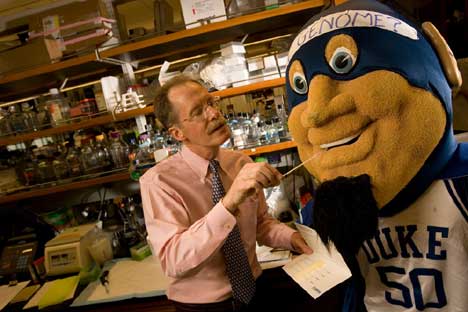
As more people ship off tubes of their saliva for testing by one of the many companies now offering genome-wide scans -- despite the cautionary advice of many physicians it's hard not to wonder: Just what is it that these early adopters of personal genomics hope to gain by knowing what's "written" in their DNA? And what, if anything, will they do with the information once they've got it?
Researchers at the Duke Institute for Genome Sciences & Policy (IGSP) have launched a study designed to find answers. The effort is the first, as far as the researchers know, specifically aimed to explore participants' perceptions about their genomes and the effect that their genomic information will have on them.
"It is clear that some among us, whatever the motivation, are ready to test their genomes. But why?" said Huntington Willard, IGSP director and a principal investigator of the Duke Personal Variome Project, which will test a million highly variable positions (called single nucleotide polymorphisms or "SNPs") across the genomes of each of its participants.
While experts agree that the genome sciences hold great promise for personalizing medicine, the connection between particular gene variants in the genome and the risk for many of the most common diseases such as diabetes and heart disease remains rather limited so far. "We remain in a situation where we have very little that is clinically actionable," said David Goldstein, director of the IGSP's Center for Population Genomics and Pharmacogenetics and co-PI of the new project.
"Given the early state of the science, individuals may come to this with high expectations of the knowledge that whole genome testing can provide, when, for many conditions, family history or lifestyle may be just as predictive, if not more, of increased risk," added Susanne Haga, senior policy analyst and an IGSP assistant research professor who is also a study investigator. "In addition, some individuals may not have considered all of the possible ramifications, for themselves and for their family, of obtaining risk information for conditions such as late-onset diseases that are debilitating and have little in the way of treatment options."
Despite these concerns and constraints, personal genomics is growing in popularity, spurred primarily by a rapid decline in costs. While the price tag of the original Human Genome Project came to $2.7 billion for a single reference genome, one company recently announced that they could sequence a complete human genome for $60,000. The only company offering whole genome sequencing to consumers right now is charging $350,000 for their services, but genome-wide SNP services are available for as little as $985.
The one million SNPs examined in each individual participating in the new Duke project will represent just 0.03 percent of their genome, Willard said, but should capture most of the meaningful variation, and for under $1,000 per person.
While the findings of the new study may add to understanding of how humans differ on a DNA level, "the Duke Personal Variome Project is as much a social experiment as a scientific one," Willard said.
Those participating in the study will be asked before and after their test about their motivations, expectations and perceptions of the value of new genome technologies and their test results. They will also be asked about their attitudes toward potential public disclosure of their personal genomic information.
Participants in the study will choose whether or not they want their test results. They will also be able to pick and choose specific information they want to exclude such as information about SNPs with potential links to neurological diseases or cancer, for instance. Those who continue and get their test results will be interviewed immediately post-test and again every three months for the next year.
The researchers have recruited 14 people from the Duke and Durham community for the first phase of the project. Those participating in this early stage were required to have backgrounds in genetics or genomics to ensure that the researchers could obtain truly informed consent.
As the researchers work out some of the logistics in the first phase, including how to best convey the results, the project is expected to expand to members of the general public.